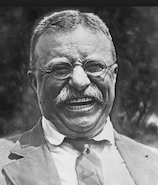
If we live our lives in fear of failure,
RICK WOLF
the memories of opportunities missed
will haunt us forever.
For the past week I have been living in NJ and watching Tucker, my son’s dog, while he and the family were taking a short vacation. While I did enjoy some golf, two days of rain gave me lots of time to enjoy morning news programs, catch-up on some back “Coursera” assignments, read email that had stored away for a rainy day, and reflect. Ironically a recent news story, the back assignments, and one of the articles considered the same topic and gave me much to think about as I considered the question of embracing failure as a means of growing and finding success.
Embracing failure needs to begin in childhood, however in a society that focus on success, celebrity, fame and wealth, failure is linked with the sense of not being good enough. To compound this, we have parents who attempt to clear the way of every obstacle a child may encounter. They couldn’t be doing their child a greater disservice! Early failure helps children develop the coping and problem-solving skills they will need for obstacles they will encounter in the future. It helps develop resilience, or as Angela Duckworth calls it, “Grit”. Failure is a hugely important part of learning. By failing, we see where we need to improve. Failure is not something to be feared, rather it is to be embraced; for it is only through failing that we can appreciate success.
The fear of failure is a component of an on-line course I am currently taking with Richard Shell, (Univ. of PA, Wharton School). He shares the story of his afternoon in a forest located behind a Buddhist monastery in Sri Lanka, where he was living at the time. He recounts, “ I was simply walking along wondering why the monk had sent me back there, and all of a sudden I noticed that the whole forest floor was covered with dead leaves, and I noticed that there was a dead bird under a tree. I saw that the soil was filled with insects and animals that were sort of basically reprocessing the forest floor from all this detritus of nature into something that would give rise to new life, and it just hit me as if I had been reading a book and that someone had just given me the key to translating it. That the book was the book of life, and that the main message was that life and death were connected and had to be with one another in order for either one to be.” Shell shares that at that moment he stopped fearing death and running from it. He embraced death as a part of the life process. Much the same is true of failure. Failure and success are connected and neither can exist without the other. We have a choice; we can become consumed with running from the fear of failure, or we can choose to embrace it for what it is, a fear. To find success we must transition from running away from our fears. Then, and only then, will we have the opportunity to run with all our energy toward the future and toward the goals that we want to achieve.
The link between failure and success is further developed by Dr. Scott Cowen, President Emeritus of Tulane University. His leadership post, The Value of Failure: How We Can Make the Most of Losing” considers the valuable lessons to be learned from first-hand failure. He writes, “Instead of just focusing on what it takes to be successful, we should be keenly aware of shortcomings that hinder our success. As much as we like to win, we are all prone to making mistakes. Failing is a natural, necessary process.” He identifies a list of six failures that were part of his personal leadership path as well as failures that he has observed in other leaders or that emerged as common themes in conversations with leaders. They include:
- Failure 1: The inability to understand reality
- Failure 2: Hiring the wrong person and taking too long to correct the mistake
- Failure 3: Lack of courage in decision making for fear of failure, controversy or being disliked
- Failure 4: Failure to listen to and learn from those who disagree with you
- Failure 5: Lack of understanding of one’s personal strengths and weaknesses
- Failure 6: Not knowing when to leave
Cowen concludes his post with a powerful statement on the value of failure, “By better understanding how we can fail, we are ultimately learning how to succeed.”
It takes courage to fail, and it takes even greater courage to rise after failing and continue forward. Teddy Roosevelt said it best when describing, “The Man in the Arena”
“It is not the critic who counts; not the man
who points out how the strong man stumbles,
or where the doer of deeds could have done
them better. The credit belongs to the man
who is actually in the arena, whose face
is marred by dust and sweat and blood;
who strives valiantly; who errs,
who comes up short again and again,
because there is no effort without error
and shortcoming; but who does actually
strive to do the deeds; who knows great
enthusiasms, the great devotions; who spends
himself in a worthy cause; who at the best knows
in the end the triumph of high achievement,
and who at the worst, if he fails, at least fails
while daring greatly, so that his place shall never
be with those cold and timid souls who
neither know victory nor defeat.”
EMBRACE THE FEAR
EMBRACE THE CHALLENGE
